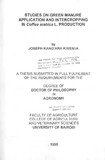| dc.description.abstract | Three experiments were conducted between May 1991 and December
1993 at Coffee Research Station Ruiru. Kenya, to study the effect of green
manure application and intercropping on soil chemical properties, coffee
plant growth, bean yield and quality.
The first experiment was to study the effect of applying as mulch
various leguminous green manures plants to coffee (Goftea arabica Cv.
'Ruiru 11') at field establishment phase. The leguminous green manures
tested were from Leucaena leucocephala, Sesbania sesban, Galliandra
calothyrus, Medicago sativa, Desmodium intortum and Gajanus cajan.
Application of the various green manures except that from
Desmodium did not significantly affect the coffee growth. The application
however, significantly reduced primary extension and leaf area of coffee
plants. Application of the various green manures significantly depressed
the coffee yields.
It was concluded that application of green manures to coffee plants
could only be beneficial during the first year after coffee establishment but
the green manures may not be able to supply adequate plant nutrients.
They however improved the soil physical characteristics.
The second experiment was to study the effect of intercropping
coffee plants, during the establishment phase, with the following fruits:
pawpaws (Garica papaya), passion fruit (Passiflora edulis), apples (Malus
(xxiii)
pumila), oranges (Citrus sinesis), bananas (Musa sapentium), guava
(Psidium guajava) , avocadoes (Persea americana), loquats (Eriobotrya
japonica) and macadamia (Macadamia temifo/ia). Banana and guava
intercrops significantly depressed coffee plant height, plant stem diameter
and yield components (number of primaries and nodes per primary).
However, the depression did not affect the clean coffee yields. The other
fruit tree intercrops did not significantly affect coffee tree growth or clean
coffee yields or the bean quality.
The third experiment was to study the effects of intercropping mature
arabica coffee CV SL 28 during the change of cycle phase, with beans
(Phaseolus vulgaris), cowpea (Vigna unguiculata), Irish potatoes (Solanum
tuberosum), tomatoes (Lycopersicon esculentum), sweet potatoes (Ipomea
batatas) and garden peas (Pisum sativum). The results showed that the
food intercrops did not significantly affect coffee tree growth and coffee
bean yield and quality. Yields of the intercrops were also not affected by
coffee plants during the first year after change of cycle. However, during
the second year, the yields were reduced due to the heavy canopy
especially under high density. Although there was a yield advantage during
the two years of change of cycle, it was uneconomical to intercrop during
the second year.
The various fruit and food crops evaluated are suitable intercrops in
coffee. Intercropping food crops during change of cycle phase should be
limited to the first year only. | en |

